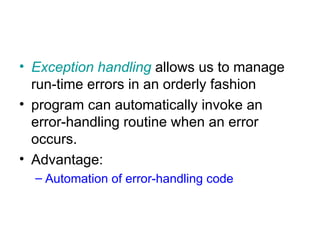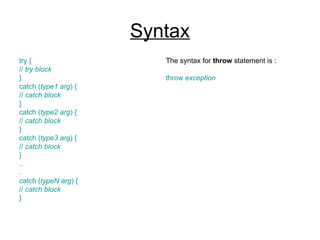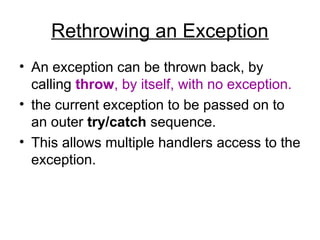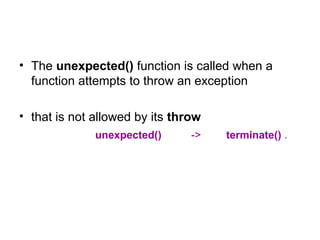Exceptions in C++exception handling in C++, computer programming.ppt
- 2. • Exception handling allows us to manage run-time errors in an orderly fashion • program can automatically invoke an error-handling routine when an error occurs. • Advantage: – Automation of error-handling code
- 3. Exception Handling Fundamentals • three basic keywords: try, catch, and throw. • program statements that you want to monitor for exceptions are contained in a try block. • If an exception (i.e., an error) occurs within the try block, it is thrown (using throw). • Functions called from within a try block may also throw an exception. • The exception is caught, using catch, and processed.
- 4. Syntax try { // try block } catch (type1 arg) { // catch block } catch (type2 arg) { // catch block } catch (type3 arg) { // catch block } .. . catch (typeN arg) { // catch block } The syntax for throw statement is : throw exception
- 5. Handling Exceptions • When an exception is thrown, it is caught by its corresponding catch statement. • There can be more than one catch statement associated with a try. • If the data type specified by a catch matches that of the exception, then that catch statement is executed (and all others are bypassed).
- 6. Unhandled Exceptions • If there is no applicable catch statement, an abnormal program termination may occur. • For an unhandled exception, standard library function terminate() is invoked. • By default, terminate() calls abort() to stop the program
- 7. Example: #include <iostream> using namespace std; int main() { cout << "Startn"; try { // start a try block cout << "Inside try blockn"; throw 100; // throw an error cout << "This will not execute"; } catch (int i) { // catch an error cout << "Caught an exception -- value is: "; cout << i << "n"; } cout << "End"; } • Output: Start Inside try block Caught an exception -- value is: 100 End
- 8. • Once an exception has been thrown, control passes to the catch expression and the try block is terminated. • catch is not called. Rather, program execution is transferred to it. • The program's stack is automatically reset. • The statements following the throw will never execute. • If the error can be fixed, execution will continue after catch, else a catch block will terminate the program with a call to exit() or abort() .
- 9. The type of the exception must match the type specified in a catch statement The exception will not be caught and abnormal termination will occur #include <iostream> using namespace std; int main() { cout << "Startn"; try { // start a try block cout << "Inside try blockn"; throw 100; // throw an error cout << "This will not execute"; } catch (double i) { // won't work for an int exception cout << "Caught an exception -- value is: "; cout << i << "n"; } cout << "End"; return 0; } Output Start Inside try block Abnormal program termination
- 10. Throwing an exception from a function outside the try block. #include <iostream> using namespace std; void Xtest(int test) { cout << "Inside Xtest, test is: " << test << " n"; if(test) throw test; } int main() { cout << "Startn"; try { // start a try block cout << "Inside try blockn"; Xtest(0); Xtest(1); Xtest(2); } catch (int i) { // catch an error cout << "Caught an exception -- value is: "; cout << i << "n"; } cout << "End"; return 0; } Output: Start Inside try block Inside Xtest, test is: 0 Inside Xtest, test is: 1 Caught an exception -- value is: 1 End
- 11. Local try block #include <iostream> using namespace std; // Localize a try/catch to a function. void Xhandler(int test) { try{ if(test) throw test; } catch(int i) { cout << "Caught Exception #: " << i << 'n'; } } int main() { cout << "Startn"; Xhandler(1); Xhandler(2); Xhandler(0); Xhandler(3); cout << "End"; return 0; } Output: Start Caught Exception #: 1 Caught Exception #: 2 Caught Exception #: 3 End
- 12. Catching Class Types • Generally an exception can be of any type. • In real-world programs, most exceptions will be class types rather than built-in types. • common reason - to create an object that describes the error. • It can be used by the exception handler to help it process the error.
- 13. // Catching class type exceptions. #include <iostream> #include <cstring> using namespace std; class MyException { public: char str_what[80]; int what; MyException() { *str_what = 0; what = 0; } MyException(char *s, int e) { strcpy(str_what, s); what = e; } }; int main() { int i; try { cout << "Enter a positive number: "; cin >> i; if(i<0) throw MyException("Not Positive", i); } catch (MyException e) { // catch an error cout << e.str_what << ": "; cout << e.what << "n"; } return 0; } Output: Enter a positive number: -4 Not Positive: -4
- 14. Using Multiple catch Statements • There can be more than one catch associated with a try. • Each catch must catch a different type of exception.
- 15. #include <iostream> using namespace std; // Different types of exceptions can be caught. void Xhandler(int test) { try{ if(test) throw test; else throw "Value is zero"; } catch(int i) { cout << "Caught Exception #: " << i << 'n'; } catch(const char *str) { cout << "Caught a string: "; cout << str << 'n'; } } int main() { cout << "Startn"; Xhandler(1); Xhandler(2); Xhandler(0); Xhandler(3); cout << "End"; return 0; } Output: Start Caught Exception #: 1 Caught Exception #: 2 Caught a string: Value is zero Caught Exception #: 3 End
- 16. Handling Derived-Class Exceptions • order of catch statements is most important while inheriting. • because a catch clause for a base class will also match any class derived from that base. • to catch exceptions of both a base class and a derived class, put the derived class first in the catch sequence.
- 17. // Catching derived classes. #include <iostream> using namespace std; class B { }; class D: public B { }; int main() { D derived; try { throw derived; } catch(B b) { cout << "Caught a base class.n"; } catch(D d) { cout << "This won't execute.n"; } return 0; } • In this example the catch clause of the base class will always be executed. • reverse the order of the catch clauses
- 18. Exception Handling Options Additional features and nuances that make it easier and more convenient to use are, • Catching All Exceptions • Restricting Exceptions • Rethrowing an Exception
- 19. Catching All Exceptions • This catch block will catch all kind of exceptions • Syntax: catch(...) { // process all exceptions }
- 20. // This example catches all exceptions. #include <iostream> using namespace std; void Xhandler(int test) { try{ if(test==0) throw test; // throw int if(test==1) throw 'a'; // throw char if(test==2) throw 123.23; // throw double } catch(...) { // catch all exceptions cout << "Caught One!n"; } } int main() { cout << "Startn"; Xhandler(0); Xhandler(1); Xhandler(2); cout << "End"; return 0; } Output: Start Caught One! Caught One! Caught One! End
- 21. This block can be made the last catch block to catch all the left out exceptions // This example uses catch(...) as a default. #include <iostream> using namespace std; void Xhandler(int test) { try{ if(test==0) throw test; // throw int if(test==1) throw 'a'; // throw char if(test==2) throw 123.23; // throw double } catch(int i) { // catch an int exception cout << "Caught an integern"; } catch(...) { // catch all other exceptions cout << "Caught One!n"; } } int main() { cout << "Startn"; Xhandler(0); Xhandler(1); Xhandler(2); cout << "End"; return 0; } OUTPUT: Start Caught an integer Caught One! Caught One! End
- 22. Restricting Exceptions • Exceptions thrown outside the functions can be restricted. • To accomplish these restrictions, you must add a throw clause to a function definition.
- 23. • Syntax: ret-type func-name(arg-list) throw(type-list) { //.. } • Only the types specified in the type-list can be thrown as exceptions. • Throwing any other type of expression will cause abnormal program termination • Attempting to throw an exception that is not supported by a function will cause the standard library function unexpected() to be called unexpected() -> abort()
- 24. // Restricting function throw types. #include <iostream> using namespace std; // This function can only throw ints, chars, and doubles. void Xhandler(int test) throw(int, char, double) { if(test==0) throw test; // throw int if(test==1) throw 'a'; // throw char if(test==2) throw 123.23; // throw double } int main() { cout << "startn"; try{ Xhandler(0); // also, try passing 1 and 2 to Xhandler() } catch(int i) { cout << "Caught an integern"; } catch(char c) { cout << "Caught charn"; } catch(double d) { cout << "Caught doublen"; } cout << "end"; return 0; }
- 25. // This function can throw NO exceptions! void Xhandler(int test) throw() { /* The following statements no longer work. Instead, they will cause an abnormal program termination. */ if(test==0) throw test; if(test==1) throw 'a'; if(test==2) throw 123.23; }
- 26. Rethrowing an Exception • An exception can be thrown back, by calling throw, by itself, with no exception. • the current exception to be passed on to an outer try/catch sequence. • This allows multiple handlers access to the exception.
- 27. // Example of "rethrowing" an exception. #include <iostream> using namespace std; void Xhandler() { try { throw "hello"; // throw a char * } catch(const char *) { // catch a char * cout << "Caught char * inside Xhandlern"; throw ; // rethrow char * out of function } } int main() { cout << "Startn"; try{ Xhandler(); } catch(const char *) { cout << "Caught char * inside mainn"; } cout << "End"; return 0; } Output: Start Caught char * inside Xhandler Caught char * inside main End
- 28. Understanding terminate() and unexpected() • These functions are supplied by the Standard C++ library • These functions require the header <exception>. • Prototypes – void terminate( ); – void unexpected( );
- 29. • The terminate() function is called whenever program attempts to rethrow an exception when no exception was originally thrown. • Eg: Unwinding the stack because of an exception, a destructor for an object may throw an exception • terminate() is the handler of last resort when no other handlers for an exception are available. terminate() -> abort()
- 30. • The unexpected() function is called when a function attempts to throw an exception • that is not allowed by its throw unexpected() -> terminate() .
- 31. Setting the Terminate and Unexpected Handlers • Syntax: terminate_handler set_terminate(terminate_handler newhandler) throw(); unexpected_handler set_unexpected(unexpected_handler newhandler) throw(); Both set_terminate() and set_unexpected() require the header <exception>.
- 32. // Set a new terminate handler. #include <iostream> #include <cstdlib> #include <exception> using namespace std; void my_Thandler() { cout << "Inside new terminate handlern"; abort(); } int main() { // set a new terminate handler set_terminate(my_Thandler); try { cout << "Inside try blockn"; throw 100; // throw an error } catch (double i) { // won't catch an int exception // ... } return 0; } Output: Inside try block Inside new terminate handler abnormal program termination
- 33. The uncaught_exception( ) Function bool uncaught_exception( ); True -> if an exception has been thrown but not yet caught. False -> Exception is caught.
- 34. The exception and bad_exception Classes • Exceptions thrown by C++ standard library will be object derived from the base class exception. • An object of the class bad_exception can be thrown by the unexpected handler • These classes require the header <exception.h>.
- 35. Applying Exception Handling • Exception handling is designed to provide a structured means to handle abnormal events. • The error handler must do something rational when an error occurs.
- 36. #include <iostream> using namespace std; void divide(double a, double b); int main() { double i, j; do { cout << "Enter numerator (0 to stop): "; cin >> i; cout << "Enter denominator: "; cin >> j; divide(i, j); } while(i != 0); return 0; } void divide(double a, double b) { try { if(!b) throw b; // check for divide-by-zero cout << "Result: " << a/b << endl; } catch (double b) { cout << "Can't divide by zero.n"; } }












![// Catching class type exceptions.
#include <iostream>
#include <cstring>
using namespace std;
class MyException {
public:
char str_what[80];
int what;
MyException() { *str_what = 0; what = 0; }
MyException(char *s, int e) {
strcpy(str_what, s);
what = e;
}
};
int main()
{
int i;
try {
cout << "Enter a positive number: ";
cin >> i;
if(i<0)
throw MyException("Not Positive", i);
}
catch (MyException e) { // catch an error
cout << e.str_what << ": ";
cout << e.what << "n";
}
return 0;
}
Output:
Enter a positive number: -4
Not Positive: -4](https://image.slidesharecdn.com/exceptionsinc-250427103327-31d79569/85/Exceptions-in-C-exception-handling-in-C-computer-programming-ppt-13-320.jpg)






















